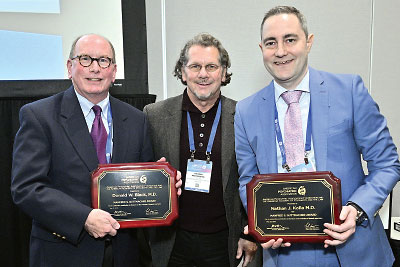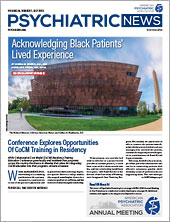Donald Black, M.D., introduced antisocial personality disorder in a session at APA’s 2023 Annual Meeting as psychiatry’s Rodney Dangerfield. “It gets no respect,” he said.
Black and Nathan Kolla, M.D., Ph.D., are the winners of APA’s 2023
Manfred S. Guttmacher Award for their book,
Textbook of Antisocial Personality Disorder from APA Publishing.
The award, established in 1975, recognizes an outstanding contribution to the literature of forensic psychiatry in the form of a book, monograph, paper, or other work. It is a joint award of the APA Foundation and the American Academy of Psychiatry and the Law.
Black is a professor emeritus of psychiatry at the University of Iowa, chief of mental health at the Iowa City VA Medical Center, and president of the American Academy of Clinical Psychiatrists. Kolla is a senior scientist and forensic psychiatrist at the Centre for Addiction and Mental Health Brain Health Imaging Centre in Toronto, Canada, and the Waypoint/University of Toronto Research Chair in Forensic Mental Health Science at Waypoint Centre for Mental Health Care.
Antisocial personality disorder occurs along a spectrum of severity, Black said, and clinical descriptions of the disorder have changed over time. Black describes it as a disorder of lifelong, serial misbehavior. Symptoms of the disorder include repeated unlawful behaviors, deceitfulness, impulsivity, aggressiveness, and lack of remorse. The DSM-5 criteria for the disorder includes exhibiting a pervasive pattern and disregard for the rights of others since age 15. Black also noted that the IQs of individuals with antisocial personality disorder are typically about 10 percentage points lower than the average.
The disorder is two to seven times more common in men than women and is associated with lower incomes, lower educational levels, younger age, and urban residence. Additionally, it begins early, often by age 5. These individuals also die early, Black said, due to suicide, accidents, or natural causes.
Family, twin, and adoption studies all point to genetic transmission of antisocial personality disorder, while social theories of causation include poor parental bonding or childhood maltreatment, Black explained. Importantly, there is no standard, evidence-based treatment for the disorder; no FDA-approved medications; and no proven psychotherapies to treat it. Cognitive-behavioral therapy may be appropriate for mild cases, Black said, but the evidence is limited.
Black debunked several myths related to antisocial personality disorder, including the following:
•
The disorder doesn’t exist. Black emphasized that the disorder is remarkably common. “Every single epidemiological study in the U.S., Canada, the U.K., and Western Europe comes up with similar figures: 3% to 5% of the adult population,” he said. “It has been found in every single culture.”
•
The disorder is an excuse for bad behavior. Critics argue that the disorder medicalizes bad behavior, threatening the notion of personal responsibility. But psychiatrists know that antisocial persons know right from wrong; they just don’t care, Black said.
•
Antisocial is another term for criminal. Antisocial personality disorder is a broad behavioral syndrome, Black said. “Crime is just one aspect.”
•
People with antisocial personality disorder never improve. “While many antisocial people face a bleak future, many improve, with some no longer meeting DSM criteria,” he said.
•
People with the disorder are evil. “Determining if someone is evil is the job of theologians,” he said.
•
The outlook for patients is hopeless, as there are no treatments. The reality is that treatments for antisocial personality disorder have never been studied, Black said. “Thus, we cannot conclude that it is untreatable.”
Kolla described the work that has been done to assess the neurochemistry of individuals with antisocial personality disorder using positron emission tomography (PET). He and his colleagues investigated MAO-A, an enzyme that regulates neurotransmitters, in the brains of people with antisocial personality disorder. Lower MOA-A levels have been shown to be associated with greater impulsivity or aggression. As they hypothesized, Kolla and his colleagues found lower levels of MOA-A in some regions of the brains of those with antisocial personality disorder. Their findings were published in 2015 in Neuropsychopharmacology.
The researchers conducted the same study in individuals with borderline personality disorder. In contrast to those with antisocial personality disorder, those with borderline personality disorder had elevated levels of MOA-A, which were associated with multiple indicators of the severity of the disorder, including mood symptoms and suicidality. Their findings were published in 2016 in Biological Psychiatry.
Additionally, Kolla described the work around studying fatty acid amide hydrolase (FAAH), an enzyme of the endocannabinoid system, in the brains of individuals with antisocial personality disorder. Kolla and his colleagues found that FAAH expression was lower in certain brain regions of these individuals compared with those without antisocial personality disorder. The findings were published in 2021 in Translational Psychiatry.
“Could interventions that increase FAAH in a regionally specific manner emerge as viable treatment options for antisocial personality disorder?” Kolla asked. One potential candidate is leptin, a hormone that could be used to increase brain FAAH levels. A number of clinical studies have found lower levels of leptin in people with antisocial personality disorder. “This is one avenue for a possible therapeutic that has to be tested but could be examined in this population,” he said. ■

